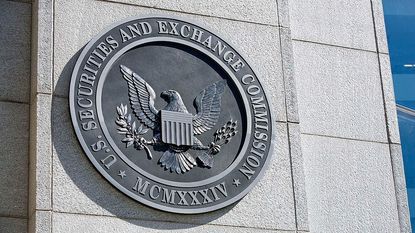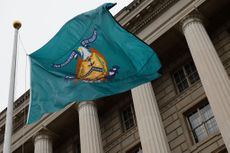The Supreme Court could reign in the SEC — and federal agencies as a whole
The court is hearing arguments on the agency's ability to enforce financial penalties


The U.S. Supreme Court is set to hear a number of cases this term that could limit the power of the federal government. One of these cases is slated to come to a head on Wednesday, where the high court will hear oral arguments in SEC v. Jarkesy.
The case pits hedge fund manager George R. Jarkesy against the U.S. Securities and Exchange Commission (SEC), the agency responsible for regulating Wall Street and the nation's financial markets. Following an administrative investigation by the SEC, the agency's in-house judges found that Jarkesy had committed securities fraud, resulting in his being fined and barred from the financial sector. These in-house judges work for federal agencies as opposed to a judiciary, and adjudicate internal matters for these agencies.
Jarkesy sued the SEC, arguing that its use of in-house judges violated his right to a jury trial. "It is widely recognized that the SEC virtually always wins in its own home courts," Jarkesy's lawyers wrote in the case filing. If the Supreme Court rules in favor of Jarkesy, it could strip the SEC of its ability to levy fines while also minimizing the effectiveness of in-house judges and adjudicators across the federal government. Those in favor of small government have backed Jarkesy's lawsuit, while others have cautioned against further hindering federal agencies.
Subscribe to The Week
Escape your echo chamber. Get the facts behind the news, plus analysis from multiple perspectives.

Sign up for The Week's Free Newsletters
From our morning news briefing to a weekly Good News Newsletter, get the best of The Week delivered directly to your inbox.
From our morning news briefing to a weekly Good News Newsletter, get the best of The Week delivered directly to your inbox.
The case could 'destroy the government'
SEC v. Jarkesy "poses the most direct challenge yet to the legitimacy of the modern federal government," Noah Rosenblum wrote for The Atlantic. Jarkesy's main argument is that the SEC's in-house judges do not have the constitutional right to enforce laws. In the modern Supreme Court, this case has "a good chance of destroying the federal government's administrative capacity — taking down its ability to protect Americans' health and safety while unleashing fraud in the financial markets."
While these types of arguments "have been rejected by federal courts many times already," Rosenblum added, "the federal judiciary has drastically changed in recent years, and the Supreme Court with it — opening the possibility of a new, friendly reception to these absurd legal claims." Given that the SEC is the basic regulator of the financial markets, "the consequences of Jarkesy's success would be disastrous, especially for the American economy," Rosenblum said.
There are around 2,000 in-house judges working throughout the executive branch, and minimizing their power "could pose an existential threat to federal agencies that protect Americans and make determinations on the government benefits they are owed," Devon Ombres opined for the liberal think tank American Progress. If Jarkesy wins the case, it would show that the Supreme Court "is seeking to limit Congress' powers and put its policy preferences above those of elected officials."
The case could "create chaos for the millions of Americans and businesses who rely on the professionalism, consistency, and neutrality" of in-house judges to adjudicate issues, Ombres wrote. A ruling favorable to Jarkesy would also "overturn long-standing Supreme Court precedent that Congress has broad powers to delegate authority," he added.
A jury trial is a 'bedrock constitutional principle'
The case puts at stake "a bedrock constitutional principle that colonists fought to defend in the American Revolution: the right to a trial by jury," opined the editorial board of The Wall Street Journal. Congress has granted the SEC — and other agencies — more power to levy penalties in recent years, and "Democrats wanted to make it easier for the agency to punish misconduct," the board added.
In-house trials "let SEC prosecutors present hearsay evidence and unauthenticated documents that would be inadmissible in a traditional federal court," the board said. So it is "no surprise, then, that the SEC wins almost all cases it charges in-house." The outlet added that these in-house courts "resemble those that the British government used to punish colonists."
Overreach "is precisely the kind of thing that is bound to happen when employees of a single administrative agency serve as prosecutor, judge and jury," Robert Johnson wrote for The Hill. "Independent judges and juries are supposed to stand between private citizens and the government. Agency bureaucrats are no substitute."
The consequences of ruling against the SEC "are not nearly as sweeping as the government suggests," Johnson opined. While the majority of in-house judges don't decide overly consequential cases, "when the government tries to take your money because it claims you did something wrong, then you are entitled to make your defense in a real court."

Continue reading for free
We hope you're enjoying The Week's refreshingly open-minded journalism.
Subscribed to The Week? Register your account with the same email as your subscription.
Sign up to our 10 Things You Need to Know Today newsletter
A free daily digest of the biggest news stories of the day - and the best features from our website
Justin Klawans has worked as a staff writer at The Week since 2022. He began his career covering local news before joining Newsweek as a breaking news reporter, where he wrote about politics, national and global affairs, business, crime, sports, film, television and other Hollywood news. Justin has also freelanced for outlets including Collider and United Press International.
-
 Today's political cartoons - December 3, 2023
Today's political cartoons - December 3, 2023Cartoons Sunday's cartoons - life expectancy goes up, Kissinger goes down, and more
By The Week US Published
-
 10 things you need to know today: December 3, 2023
10 things you need to know today: December 3, 2023Daily Briefing Gaza residents flee as Israel continues bombardment, Trump tells supporters to 'guard the vote' in Democratic cities, and more
By Justin Klawans, The Week US Published
-
 5 X-plosive cartoons about Elon Musk
5 X-plosive cartoons about Elon MuskCartoons Artists take on his proposed clean-up of X, his views on advertisers, and more
By The Week US Published
-
 Remembering former US Justice Sandra Day O'Connor, the first woman on the Supreme Court
Remembering former US Justice Sandra Day O'Connor, the first woman on the Supreme Courtthe explainer O'Connor played a pivotal role on the bench and was regarded as the one of the powerful women of her era
By Theara Coleman, The Week US Published
-
 Worklessness: a national 'scandal'
Worklessness: a national 'scandal'Talking Point One in five working-age adults in Birmingham, Glasgow and Liverpool are neither in work nor seeking work
By The Week UK Published
-
 Alleged Sikh assassination plot rocks US-India relations
Alleged Sikh assassination plot rocks US-India relationsTalking Point By accusing an Indian government official of orchestrating an assassination attempt on a US citizen in New York, the Justice Department risks a diplomatic crisis between two superpower
By Rafi Schwartz, The Week US Published
-
 Dublin riots: a blow to Ireland’s reputation
Dublin riots: a blow to Ireland’s reputationTalking Point Unrest shines a spotlight on Ireland's experience of mass migration
By The Week UK Published
-
 Henry Kissinger dies aged 100: a complicated legacy?
Henry Kissinger dies aged 100: a complicated legacy?Talking Point Top US diplomat and Nobel Peace Prize winner remembered as both foreign policy genius and war criminal
By Harriet Marsden, The Week UK Last updated
-
 America doesn't have a wealth tax. The Supreme Court might kill it anyway.
America doesn't have a wealth tax. The Supreme Court might kill it anyway.Talking Point Justices are being asked to do something unusual: issue opinions about hypothetical legislation
By Joel Mathis, The Week US Published
-
 'Germs can, in fact, be good'
'Germs can, in fact, be good'Instant Opinion Opinion, comment and editorials of the day
By Harold Maass, The Week US Published
-
 How a long-term truce in Gaza could have ripple effects across the Middle East
How a long-term truce in Gaza could have ripple effects across the Middle EastTalking Point Israel and Hamas have recently agreed to extend their peace for two more days
By Justin Klawans, The Week US Published










